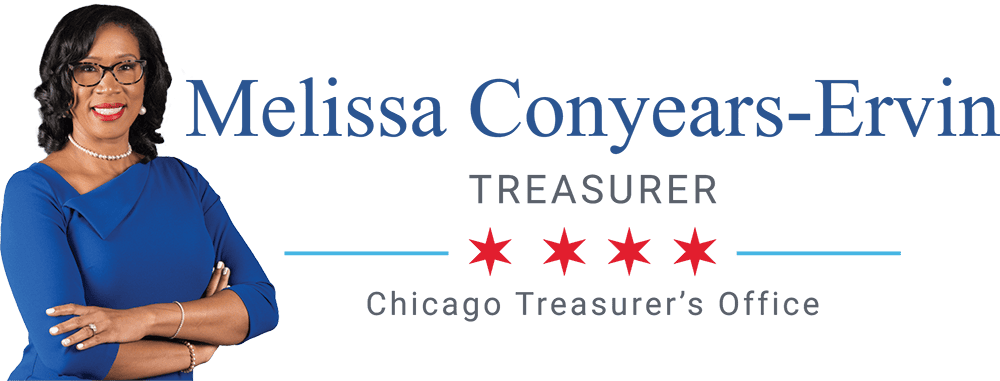Chicago, IL— (January 24, 2023) January 2023 marks “Financial Wellness Month,” which was created to remind us to pay closer attention to our financial well-being and help us prepare our finances for the new year. One of the top goals of many people is to ramp up savings and build an emergency fund. City Treasurer Melissa Conyears-Ervin shares some common-sense tips on how to turn that resolution into reality.
“There are many ways to save money – increase 401(k) contributions, set up automatic transfers to a high-yield savings account, cut back on unnecessary spending – but whatever path you choose, the key is to start saving, and stick with it,” said Treasurer Conyears-Ervin. “The ability to consistently save and invest over time without interruptions make it more likely that people will achieve the financial goals they have set for themselves.”
Saving Money
Savings accounts and certificates of deposit are offering the highest interest rates in more than a decade. Many high-yield savings accounts are currently offering APYs of 3.5% or more. www.Bankrate.com lists the best savings accounts, and most of them are FDIC-insured, which protects individual deposits up to $250,000.
A good way to begin saving is to start small. For instance:
- Once or twice a week, consider swapping an expensive latte for a less costly cup of coffee.
- Take advantage of your nearby library. Many of them offer free downloads of digital and audio books so you can enjoy them at no cost. Movies in various formats are also available to borrow.
- Cancel unused subscriptions, especially streaming services that you aren’t watching.
- Cook meals at home. Settling for costly meal delivery or take-out charges can really add up.
Customize Your Direct Deposit
Most of us think of direct deposit as a way to simplify the check-depositing process. But did you know that you can split your direct deposits into different accounts? Doing so is a quick and easy way to direct a specific amount of money into your emergency or savings fund, while the rest goes into your checking account.
Create a Personal Budget
Having – and sticking to – a monthly budget is one of the best ways to manage your financial life. Start by writing down all your fixed expenses, such as rent or mortgage, cell phone, groceries, and
savings. Hint: Your credit card statements can show all your purchases and help with reviewing your spending by category. One free and secure online budgeting tool that consolidates financial accounts and organizes bills is www.mint.com.
Once you have a sense of how much you need to spend each month on essentials, you’ll see how much is left over for discretionary expenses, like a meal in a restaurant, a night on the town or that long-overdue vacation. Creating a budget will provide a much better idea of where you spend money and help you save money for special occasions.
Take control of your credit cards
We all know how easy it can be to run up large credit card debts. But carrying a balance means spending extra money each month on interest charges. That’s why financial advisers suggest committing to never a carry a balance by paying off your credit card balance each month.
Some people don’t glance at their credit card balances until their actual bills come due, and by then, they’ve already racked up so many charges they can’t pay them off in full. That’s why it’s important to check your credit card balances on a weekly basis. If you see them starting to climb, you’ll know to spend more carefully for the remainder of the month. Remember: Paying the entire balance helps improve your credit score and reduces interest charges or fees resulting from carrying debt from month to month.
Improve Your Credit Score
Credit scores are a way to measure your creditworthiness: a better credit score will lower your interest rate, which means smaller monthly payments when you are ready to purchase a home or another significant asset. There are many ways to improve one’s credit score: pay your bills on time (and in full, if you can); limit how many new credit cards and accounts you open; and cut back on your spending.
To keep tabs on your score and quickly identify problems such as identity theft, sign up for a service that monitors your credit profile and notifies you of any changes. The only source for a free annual credit report is www.annualcreditreport.com.
And for professional assistance with improving your credit score and help managing finances, the Chicago Treasurer’s Office and Operation HOPE offer a free personal counseling program, visit www.chicagocitytreasurer.com/hope-inside-2/.
Invest
For many people, the idea of investing their money in volatile markets like stocks or bonds can be scary. Yet history shows that a slow and patient approach to investing can pay off over time. For new investors, consider starting small: investing $50 a month in an IRA account, an index fund, or a taxable brokerage account.
For a complete list and schedule of all the City Treasurer’s Office financial education programs and a video library to help you build wealth today for tomorrow, visit www.Chicagocitytreasurer.com.

